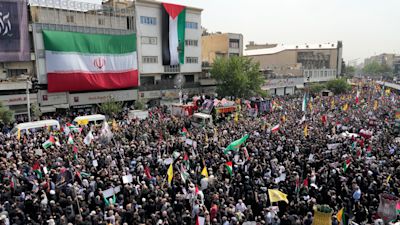Israel confirms death of top Hamas leader Deif, as region reels from high-profile assassinations

Good Morning Britain's Sarah Coates reports on the possibility of retaliation and escalation in the region
Israel has confirmed Mohammed Deif, Hamas' military chief, was killed in an airstrike on Gaza on July 13.
The missile barrage on an Israeli-declared humanitarian zone killed at least 90 Palestinians and wounded hundreds more.
The Israel Defence Forces (IDF) announced in a statement posted to X: "We can now confirm: Mohammed Deif was eliminated."
Deif was one of Israel's most wanted men. He was believed to be one of the chief architects of the October 7 attacks and founded Hamas' military wing in the 1990s.
This follows back-to-back assassinations in the Middle East, which saw Hamas' political leader Ismail Haniyeh die in a strike in Iran, and top Hezbollah leader Fouad Shukur killed in Beirut.
The attacks - both significant for taking place outside of Israeli and Palestinian territories - came less than twelve hours apart.
Israel has taken responsibility for the strike in Beirut, which killed Shukur, but has neither admitted nor denied involvement in the hit on Haniyeh in Tehran.
Analysis from ITV News' International Editor Emma Muprhy
Since the attacks of October 7, Israel vowed to destroy Hamas using that aim to justify its war in Gaza.
Three weeks ago, in an attack in the city of Khan Younis, which killed dozens of Palestinians, Israel said it had targeted Mohammed Deif, Hamas’ top military commander.
Today they confirmed they had. Hamas has yet to confirm or deny those claims.
Deif has proved an illusive figure over many years, reportedly targeted before, potentially disabled by at least one of those attempts on his life.
Any real detail is impossible to establish as fact, given the hidden and shadowy nature of his existence.
The announcement came as the funeral took place for Ismail Haniyeh, the organisation’s political leader, killed in an assassination in Tehran early on Wednesday morning.
The timing is unlikely to be a coincidence. Israel is determined to maximise the image of victory over Hamas at a point when tensions in the region, fuelled by the war in Gaza, are at an all time high.
Both Iran and Hezbollah are said to be preparing their retaliation for the killings of Haniyeh and a senior Hezbollah leader also assassinated on Tuesday night.
That retaliation will be significant and last night Israel’s prime minister Benjamin Netanyahu warned Israeli’s that “challenging days” lie ahead.
He will be hoping going into those days able to claim what he has described as a “crushing blows” to Hamas will soften any further criticism of his policy on Gaza and his leadership.
On Thursday morning, thousands of people in Iran's capital took to the streets for the funeral of Haniyeh and his bodyguard, whose coffins were paraded through the streets.
Ayatollah Ali Khamenei, Iran's supreme leader, said prayers for them, along with other representatives of the Palestinian militia Hamas.
Haniyeh and his bodyguard died on Wednesday after an airstrike hit a residence the Hamas leader was known to use in Tehran.
Despite not admitting responsibility, Israel previously vowed to kill Haniyeh and other Hamas leaders after the militant group launched an attack on Israel on October 7, 2023.
Haniyeh's death came shortly after Shukur's assassination in the southern suburbs of Beirut, an attack Israel admitted to carrying out.
Israeli officials said the strike came in response to a missile hit on a football field in the Golan Heights, an Israeli-annexed territory, which killed 12 children and teenagers. Hezbollah denied responsibility.
Confirmation of the deaths of three significant military and political figures from groups backed by Iran in just three days have stoked fears of retaliation.
Subscribe free to our weekly newsletter for exclusive and original coverage from ITV News. Direct to your inbox every Friday morning.
Crowds of thousands carrying Palestinian flags marched in Istanbul in protest against Haniyeh's killing on Wednesday.
Turkish President Recep Tayyip Erdogan, who has been one of Israel’s most vocal critics, has denounced Haniyeh’s killing as a “despicable act”.
Iran's Parliament Speaker Mohammed Bagher Qalibaf blamed the US for Haniyeh's death, and said: "Nothing happens without the coordination and support of criminal America.”
In their response to both the Beirut and Tehran strikes, the US called for peace, but avoided mention of any of the major players by name.
“Right now, the path that the region is on is toward more conflict, more violence, more suffering, more insecurity and it is crucial that we break the cycle and that starts with the cease-fire that we’ve been working on, which I believe is not only achievable, it has to be achieved,” Blinken said.
Hezbollah officials have condemned Israel's blast in Beirut that killed Shukur.
“The Israeli enemy has committed a great stupid act in size, timing and circumstances by targeting an entirely civilian area,” Hezbollah official Ali Ammar said.
"The Israeli enemy will pay a price for this sooner or later.”
Lebanon's Foreign Minister, Abdallah Rashid Bou Habib, told ITV News the attack on Beirut meant there would be a response from Hezbollah "without question", and feared the consequences.
"A regional war could mean an international war, because if there is a regional then that is the intention of Israel that the United States will get involved. This will be a very very dangerous situation," he said.
Several countries have advised against travel to Lebanon. The UK Foreign Office urged British people to leave the country, whilst Australia became the latest country to ask its citizens to avoid travelling there.
Want a quick and expert briefing on the biggest news stories? Listen to our latest podcasts to find out What You Need To Know...